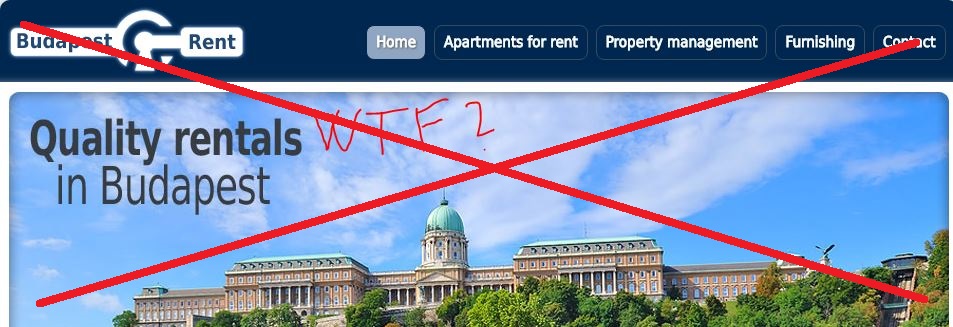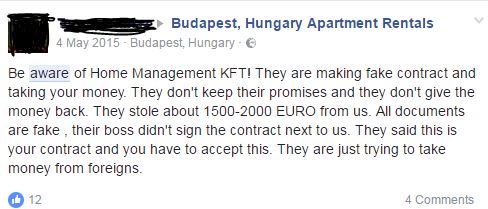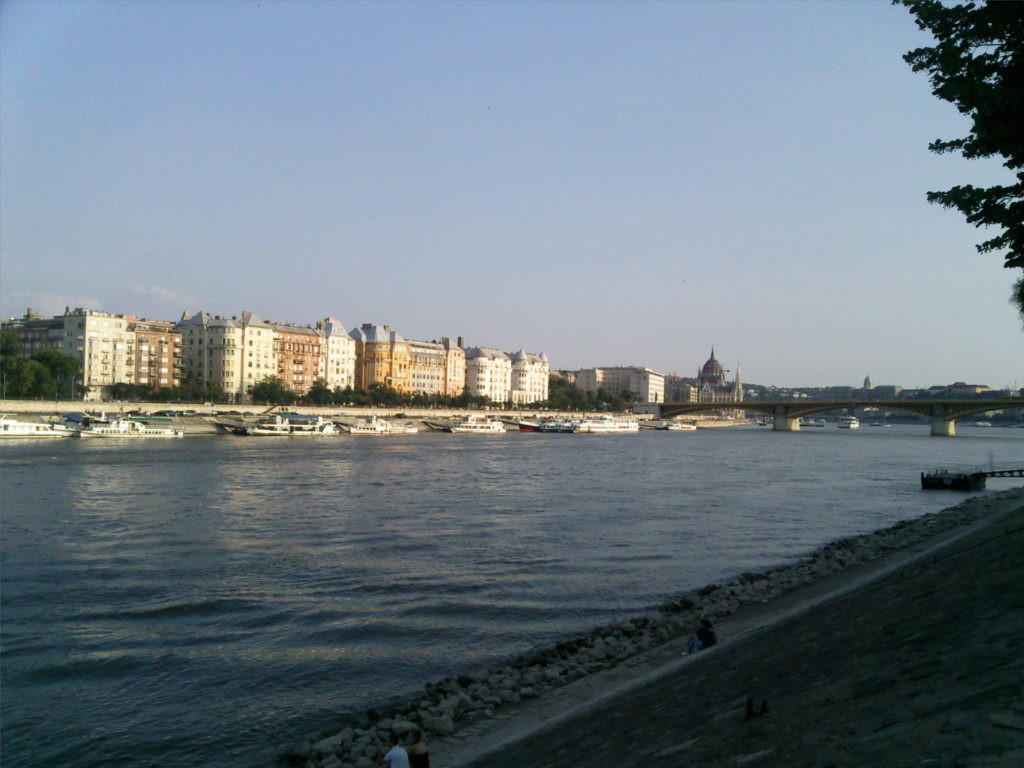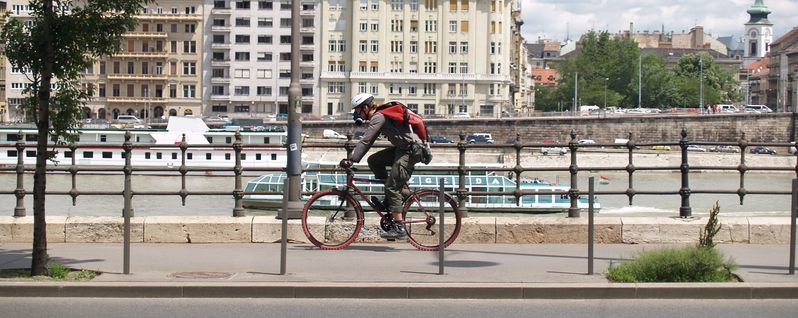Moving to a foreign country is always challenging, especially if you don’t know anyone there to give you a helping hand. Because of the pretty big language barrier, moving to Hungary is even more interesting. Well, all in all, it’s not only because of the language barrier. It’s very likely that before/after you move to Budapest, or later on, you’ll face similar question, you’ll encounter similar situations and deal with similar things as many people ordinarily do. To make your new adventure a bit easier, I’m going to give you a few tips. I hope you find them useful.
Avoid real estate agencies
One of the very first and at the same time most important aspects which anyone who intends to move to Budapest has to take into account and think over is a place to sleep. Looking for housing, in this case long-term, is sometimes a tough thing, looking for housing in a Hungarian speaking country is always a tough thing 😀 Therefore, to make your moving at least a bit easier, I would like to devote some time to this topic and outline for you the real estate situation in Budapest, give you some advice on how and where to look for a place to live and what to take heed of.
As it’s also obvious from the previous posts, or as you will see as soon as you come here, Budapest is a very cosmopolitan and touristic city with many foreigners. And as you also probably know, where there are many foreigners, there is a high danger of getting ripped off, if you happen to be one of them. At least in Central and Eastern Europe.
Generally speaking, the price level of real estate comparing other European (mainly Western countries) is still pretty low, and thus actually makes the city livable although the salaries in Hungary are very low, too. Much like in any other city, the prices differ in the center and in the suburbs, depending also on the size, quality, transport availability etc. I don’t want to provide you a detailed Budapest real estate market analysis, but since I’ve been in this position as well, let me give you a small guide.
To begin with, it’s worth noting that looking for a suitable apartment if you don’t speak the language isn’t easy at all and if you want to find one for a normal price, it might not be that fast. It is, on the other hand, quite easy to find an overpriced apartment and sign a contract with bad conditions for you. Let me then start with a warning and advising you what you shouldn’t do, unless you want to get tricked.
I think in the situations when you don’t speak the local language, don’t actually know much about the destination, about how things work there, what to be aware of, etc., looking for a place may be very time-consuming and often nerve-racking. Thus, for many of you it’s probably quite natural to go to a real estate agency, where there is, supposedly, someone speaking English who should, by the way, help you overcome such obstacles. One would say, there is nothing wrong about it. Well, in theory perhaps not, but my first piece of advice is: Do NOT do it here! Do not use services of any real estate agency in Budapest! There may be a few of those that intend to help you, but believe me, most of them will not. Quite the contrary, as I implied at the very beginning, they will use your unfamiliarity for their benefit. You won’t know which one is trustful and which one is not.
If you still want to use one, although you may be taking a risk higher than you actually think, then perhaps only those you are recommended from someone else based on real positive experience. At this point, however, I would really like to warn you and share my very bad personal experience with one of them. Please avoid the real estate agency called BudapestRent” (for “on-line marketing” reasons I don’t want to include the link, but you can figure it out from the name/picture). It’s a fraudulent real estate agency focusing on foreigners as an easy target.

Naturally, I don’t want to narrate the whole story here because I would need a separate blog for that, but feel free to contact me in case you, for some reason, want to hear it all. 🙂
To put a long story short, the practices this company, much like many others, uses are, for example:
- when moving out of the apartment, they charge you 20 000 HUF (65€) for a cleaning lady to clean the apartment. Yes please, this is how much a few minutes of a cleaning lady in Budapest is worth according to BudapestRent. I can imagine that for this price she must be a very educated women, highly experienced (not only in cleaning), dressed up in a tuxedo, and probably cleans the floor with a luxurious detergent. Assuming from the price, also her hour wage must be higher than anyone else’s at the agency,
- they charge you 5 EUR penalty for each overdue day (it’s a legal and common practice to have an overdue fine concluded in the agreement, but I don’t think such a high fine would even be in compliance with the law in my country),
- they also keep asking you to pay the rent even when you pay it regularly. They will suppress it and try convincing you that they are missing your payment and charge you a fee for being overdue,
- they don’t want to pay you back the deposit you had to pay at the very beginning, although they are obliged to do so when returning the keys. They will always come up with excuses and made up reasons not to pay it back to you.
It’s more than obvious that they simply know ways to steal money from you and rely on the fact that you, as a foreigner, won’t argue with them, let alone sue them. Simple as that. (It’s good to read the contract properly before you sign anything, by the way 😉 )
Just to close the friend’s story and experience, we gathered all the bank statements and made a calculation. This would-be real estate agency eventually owned her back over 250 000 HUF (800 €), whereas not only didn’t they want to give it back indeed, but they just kept claiming that my friends (sharing the apartment) still owned them. It took us lots of energy and our nerves, we collected our proofs, took a Hungarian friend with us and only then we were finally able to squeeze one third of the money out of them. After that we gave up on fighting for the remaining amount, so they actually “won” 160 000 HUF (516 €). Well done! By the way the office lady (bitch) was really dumb and her behavior awful. Perhaps it’s good to know that her name was Tamara Cs****.
I add another real example taken from a Facebook group with a short comment.


Not only there are many official real estate agencies that try to rip you off, but also there are many scams and trickers pretending to be real agencies or persons. The advice in this case is simple – do not pay in advance for anything you haven’t seen in person!
After the recommendation based on a real story, I would like to give you one more piece of advice: Watch out for websites on which you search for apartments! There are many Facebook groups and websites with apartments to rent, however, from what I’ve noticed, most of them are advertising overpriced, sometimes really extremely overpriced, places. I know, I know…..how do I recognize an overpriced offer? Well, let’s say, you consider the market price to feel if something is overpriced or not. I’m going to give you a small hint to have something to compare with. Don’t take it literally, the prices vary indeed, just think a bit before you take something unnecessarily expensive.
For example, I pay less than 280€ (around 85 000 HUF) in total, costs included, for a one room flat with a kitchen (45 m2). Well, it isn’t in a perfect place, not in a perfect condition, but still pretty close to the center and with very good transport connections. Okay, I have to admit that it’s located in a bit cheaper district so if you want to get a flat in downtown, of a bit better quality, with bigger area, after a reconstruction or such, you will pay more, of course. But by “more” I mean a couple of tens of euros, not a double price, or even more, as I can sometimes see.
My friend lives in a perfect area, sharing a flat with one more flatmate. It’s a big, quite new, 70m2 big apartment with basically 4 rooms, a balcony, and located close to…actually everything. They pay 470€ (around 150 000 HUF) in total, which is a very good price, but at the same time, and that’s important, more or less the real market price in Budapest (in 2014), in fact.
All I want to show by these examples is that offers like 300€ for a tiny 20m2 room in a shared flat, or 600-700€ (usually even costs excluded) for a 2 or even 3 rooms apartments are definitely not the appropriate price. Unless we are talking about a castle :-D. You should consider 300-380€ (90 000-120 000 HUF)(incl. costs) for a usual apartment in a normal place, or 150-230€ for a room in a shared apartment to be a relevant price.*
You can also check the discussion I started here with my public warning:
https://www.facebook.com/groups/budapestrentals/search/?query=250%E2%82%AC%20for%20own%2045m2
Finally, I give you a few websites, which, I believe, are more trustful:
- Alberlet.hu (which is also in English)
- realestatehungary.hu
- jofogas.hu/budapest (only in Hungarian)
- ingatlanrobot.hu (only in Hungarian)
and there are a few other websites, which can be quite relevant. Google, but be vigilant.
When looking for an apartment, Hungarian keywords such as “albérlet” (flat) or “lakás” (room) “kiádo” (rent) may be useful. In the best scenario, find a Hungarian friend to help you with searching and contacting the lessors. Looking for a place with a Hungarian speaking person will be much easier.
Good luck!
*Since I left Hungary in 2015, I haven’t really been following the Hungarian market trends, indeed, but as far as I know, the real estate price level in Hungary has gone up quite rapidly, so you have to take it into consideration and expect different prices. The whole point of the article stays the same, though. 🙂
Best Budapest neighborhoods
Now, when you know what you should be aware and beware of when looking for accommodation, I thought it would also be beneficial for you to know a little about some parts and areas of Budapest so you know better in which ones it could be convenient for you to find a place to live, as this is something you can only guess (to some extent) from a map.
Looking apart from the usual aspects, such as size of the apartment, equipment and facilities, age of the building and others, the price of a rent is dependent very much on the location of the apartment. Similarly to any bigger city, the rents are sometimes much higher in the center than in the suburbs, or even just a bit out of the center. And it’s no much different in Budapest. It’s not easy, however, to find housing for a reasonable price if you are not familiar with the locations.
So to begin with, Budapest consists of 23 districts (kerület-ek), whereas districts 1, 5-7, 13, 14 and partly 2, 8, 9, 11 and 12 are those you will most likely be interested in. In case of the latter, I say partly because the districts are quite big and in some parts they may already feel kind of far from the city center. In case of district 8, the reason is a bit different.
On the Internet or in one of many Facebook groups, you might sometimes see an advertisement or a post on a flat located in 8th district, which is generally considered to be the “dark side” of Budapest but you may also meet with comments claiming that the area doesn’t feel as dangerous and as bad as it’s said. Well, it depends on the exact location indeed, also in 8th district you can find places that are just fine, such as area inside the “Kálvin tér – Astoria – Blaha Lujza tér – Corvin-negyed” quadrilateral, and perhaps the blocks along József körút, but other than that, if you don’t want to walk at night with a pepper spray and brass knuckle, better look for a flat anywhere else. I can only acknowledge that 8th district, starting from József körút eastwards, is a one ugly (not only gipsy) ghetto, and, generally speaking, although in Budapest I don’t really feel in danger, I can’t say it about this area, not even about walking by day. That’s why here the properties are usually the cheapest.
Sadly, the 8th district (basically whole area) isn’t the only unsightly area of Budapest. At this point, I have to emphasize that in no way do I want to create a bad impression of the city, so don’t get me wrong. All in all, Budapest is a beautiful city and many people fall in love with it, but unfortunately, many parts of it are just neglected, half-destroyed and apparently poor. Most of these places are to be found out of the center so you probably won’t search in such quarters, but just in case you run into something suspiciously cheap, I’m sure you would never want to live in the parts of Újpest, Kispest or the industrial peninsula Csépel. Well, in fact, you wouldn’t probably look for an apartment outside the so called “Körút radius” (I mean, that’s how I call it, heh ).
So what’s this radius? And where is it convenient to live then? As already mentioned in one of the first posts, Budapest is divided by the Danube into two parts – Buda and Pest. And as a matter of fact, the inner city of Budapest is sort of bordered by a circle. Or a semicircle. Actually, we can say that by two semicircles (on the Pest side). And these two facts together make orientation in this city pretty easy.
The smaller circle (semicircle) on the Pest side is generally called Nagykörút (Grand Boulevard) and is formed by Ferénc, Jószef, Erszébet, Teréz and Szént István körutak (boulevards), connecting two bridges – Margit Bridge in the north and Petőfi bridge in the south. Nagykörút basically bounds the inner city center. The outer semicircle is formed by Hungária körgyűrű (Hungary ring/beltway), which is, apparently, a road ring around the broader city center. Areas external to the Hungary ring can be considered the city suburb. Have a look at the map to get a clearer picture.
Although there is an imaginary semicircle on the Buda side as well, and you can find there a few good spots, because of the historical part and hills, apartments are rather pricey. You can try your luck, but most of the reasonable offers you will find in Pest.
Naturally, the best locations are then the places near/along the boulevards, ideally near by the Grand Boulevard. If we leave out places on the Buda side, which are really nice but usually quite expensive (or too quiet for an exuberant expat’s life :-)), V. district, which is the historic & touristic center and therefore overpriced, my personal recommendation is to get a place in district XIII, in between the two mentioned boulevards (the neighborhood is called Újlipótváros). First of all, it has a really great location, perfect connection and it’s literally close to everything. Secondly, it’s the typical unheeded, sort of “forgotten”, area that hasn’t become popular (yet) by real estate agents, thus it keeps a reasonable price and is great to live in. I believe you can find such a district in every city, sometimes it just might not be that obvious at first sight.

The XIII district stretches along the eastern bank of the Danube so in just a few minutes you can be sitting by the river watching the green island with hills in the background. In just a couple of minutes you can be jogging or walking in the biggest and busiest relaxing place of Budapest – the Margarit island itself. Also the Nyugati train station with the West End shopping mall are just nearby. There are plenty of nice restaurants and cafes in the neighborhood, it’s very close to downtown and the touristic center, where you can even take a walk (a nice one along the river), and you can also get to the Buda hills pretty fast. The great transport connections are provided by M3 metro line, tram 4 and 6, bus 5 or the “sightseeing tram” number 2.
If I ever decided to move within Budapest again, I would definitely try to get an apartment in Újlipótváros 🙂
Find a Hungarian friend(s) and/or learn the language
I guess many of you have been there and know already the feeling when you are moving to a new country. Those who so far haven’t done that can perhaps imagine very well that moving abroad brings with it challenges, all the more when you don’t have a friend over there to help you. And the highest level of adventure you get when you don’t understand a word in the local language. I can assure you, in Hungary it will be very challenging not only at the beginning.
Budapest is a very cosmopolitan city with plenty of foreigners, so even if you come just by yourself (as I did), you don’t have to be afraid that you’ll stay alone here. There are many events and opportunities where you can meet and get to know international people. If you work or go to school here, you usually meet lots of foreigners as well. You may also meet and make friends with Hungarians, but you won’t probably want to speak Hungarian with them anyhow. Either way, you will be using English (or any other language than Hungarian) most of the time so you won’t even really feel the need of learning Hungarian. Well, you will survive, but let me remind you that people don’t really speak English here so you may occur in tricky situations when knowing Hungarian would come in handy.
To tell the truth, I’ve now lived in Budapest for two years without speaking, or even knowing the language a bit. Yes, I know a couple of basic words (perhaps more than a couple), when you live in the country and hear and read the language every day, you always get something indeed, but I can’t actually make a sentence. Because I didn’t make any effort to learn Hungarian, I don’t understand pretty much anything.
Naturally, people keep asking me, how can you live in Hungary without knowing Hungarian? Well, I say I can. I’m not saying it’s so easy, but so far I’ve always managed to sort everything out just with English. So yes, it’s possible to live here with English only, but on the other hand, to be honest, understanding Hungarian will make your life easier! Much easier. The language barrier is sometimes great, thus your life may be limited. Without understanding Hungarian you don’t exactly know what’s happening in the city. I mean, you don’t hear about everything, you can’t really participate in all the events, and you are then reliant on the stuff held in English. Or you need a Hungarian buddy.
People don’t speak English much, or very often they just don’t feel like it, so there are situations when you just may be unable to make do with English. Also, they often behave differently to you when they don’t need to treat you as a foreigner. Solving matters at the bank or office may be pain in the ass as well as explaining a shop assistant at the shop what you are actually looking for. But you only realize how convenient is to be a local once you get into trouble, once you encounter a problem. And I do have some personal experience with. My friend crossed swords with a real estate agency (see above) and it was impossible to deal with them without help of a Hungarian friend. Unfortunately, I’ve also experienced an accident when my friend ended up in hospital. Gaining information from the doctors/nurses was a real stinker! Gaining information from the police was perhaps even worse.
Hopefully you won’t get into anything that bad, but I can assure you that once you need to explain to a doctor what your problem is, to the police what has happened, or to a smart lady behind the desk at an office what paper you are asking for, or ask what you should fill in, you will experience the real fun 😛 .
My advice is to take a language course or find a Hungarian buddy, and learn at least the basics. It will definitely come in useful!
Don’t work for IBM…..if you want to stay a human
The main factor causing the recent big flow of foreigners coming to work and live in Budapest is the labor market and a vast job offer. Thanks to a cheaper work force (in comparison with western European countries) and also great geographical location of the city, plenty of big international companies have built their so called shared service centers here. Today you can find in Budapest about 80 of such SSCs.
While I’ve been in Budapest, I’ve been asked many times a question: What brought you to Budapest? And my answer always is: Well, I didn’t plan to move to Budapest, I wanted to move abroad, but then I ran into a job offer and here I am. The job offer was for a Czech speaker position at a very well-known big international company, as it was presented. Many people were suprised that there was someone looking for Czech speaking people in Hungary. Anyway, this famous, big international company was IBM. Yes, The IBM. Wow, that’s a cool thing I thought. Working for IBM….that’s something! My friends were as excited as I was. It was supposed to be my second job in my “career”, after the first one, which I didn’t like at all, in an accounting department of a bigger company. Now I had the opportunity for an interesting change. A big international company – I will do accountancy for some time, learn, develop and move (up) to a better position. Perhaps become a manager and earn shit loads of money.
Yeah…. I endured a bit more than one year, I couldn’t any longer. In these 15 months I changed two (actually sort of three) positions and only found out that this international, super famous company is something so bad that I would personally add myself on their blacklist so I could never be employed by them again.
It was experience for me. No doubt. Perhaps one of the most valuable ever. But mainly because it totally opened my eyes. It showed me the real corporation world, relationships inside the company and the life these people have. And consequently, it made me realize that this is not what I want to follow in my life. And that’s why I don’t regret.
If you think in a similar way as me – have higher expectations in your life, want to stay yourself and have own life, you may want to read the post till the end. Because I tell you, there is one thing for sure – if you work here for too long (for me 1 year was already long 😀 ), there is a very high chance that you just won’t stay normal.
Okay, now why I think it’s so bad. I warn you, it’s harsh but it reveals the real truth 🙂 To make it short (I plan to write a whole article about functioning of the company later on), IBM is the real definition of chaos, boredom, nonsense and non-existent logic or common sense. The whole company is a world of thousands of useless people – brainwashed managers who like to play big bosses of whatever sounds at least a bit cool and mysteriously (such as Continuous Improvement Manager, Chief Visionary Manager, “2nd Line Ass Kisser Manager” and other ridiculous “I-just-did-not-come-up-with-anything-better-but-wanted-to-be-called-manager-so-bad “ positions, but in fact nobody has a clue what their job is actually about. These people behave like they have a super power, but I bet they don’t even know how to change a light bulb at home. They are called managers, but the sad truth is that they don’t even know how to manage their life….

But it’s said that big companies also offer space for personal development and growth, have various educational programs, give you an opportunity to change positions within the company and very often allow you to grow vertically as well, right? Yes. I mean, it depends on the job, but in most positions there is usually a lot of space for personal development. Unless your IQ is like under 40, sooner or later you find out that you are pretty much able to manage your work within a few minutes or just a few hours, so there is enough time for surfing on the internet, learning languages, watching webinars, working on other projects or other possibilities of how to further educate. The other extreme is that you have a job where you are expected to do so much that you don’t remember what the sun looks like, you get brainwashed with time and you only “grow” from work to bed.
To stay fair, I really have to admit that the company, however, also provide you with some educational programs and trainings, so if you insist on the IBM based personal development, various bullshit online courses, boring videos and extremely uninteresting trainings are at your disposal.
Remember that IBM is an IT company, sometimes you’ll feel like you work at Pentagon. You will have to be using around 15-22 different kinds of software, tools and intranet sites for your daily routine. Very likely, dealing with all these tools will take you daily more time than the actual work. Don’t ask me why. I don’t know what they are good for. I usually got a point of like two of them.
What is really good in such companies, though, is that if you get tired in one position, it’s usually not so difficult to find and move to another position within the company. The bad news is that most likely you will escape from one shit to another one 😀
Anyway, if you search for a “career growth” in a corporation and have an intention to grow (higher) within the company, if you are back-stabbing enough, you are a good ass-kisser, there is a high chance you will eventually be successful. If you don’t care and just want to get a quite well paid (meaningless) job, you may be fine as well (for a while). Well, it’s still some experience and a nice row in your CV, right? But if you aren’t that type of person and prefer to do something that makes some sense, you should think it over and rather look somewhere else. It’s a company where you are just a number. You are a puppet and they send you where it’s needed. You are a part of a big process, a big project, but in fact you don’t really know what and why you are doing what you are doing. It’s even sadder that even your superior very often doesn’t know it either, and usually neither does he or she know what they are actually doing at their job.
I know this may be a shocking truth for some of you, but believe me, I’m not saying this as an unhappy employee who got fired and now hates the company. I’m saying this to save your ass…:-P If this is what you want, go for it. Otherwise stay very far away and don’t make a bad decision. I know you are thinking …ah, yeaah, what is this guy babbling. Yeah, if start working there, you will agree with me in everything. When you go out and meet people who have left the company, you will hear the same stories 😉 I think IBM ISSC sucks and sometimes I think how it can actually still exist. I’m grateful for this experience as it’s opened my eyes. But you make your own opinion and choose your own life!
Get a Helmet!
Thanks to the mostly flat landscape (I mean, there are hilly parts as well, of course, but all in all the country is pretty flat), Hungary is a good place to ride a bicycle. And I think that riding a bicycle in Budapest is quite popular, at least in Pest – the flat side of Budapest (I can tell you that riding a bicycle in the Buda hills, on the contrary, is very challenging, 😀 ).
Well, naturally, bicycles aren’t as popular as in the Netherlands, where every single Dutch has one (or more 🙂 ) and where people of all ages ride it anywhere, anytime, in any weather and in any dress, but you can see Hungarians riding bicycles quite often, too. Unlike the Netherlands, though, except for its surface as such, Budapest doesn’t have very good conditions for riding a bicycle as people are just not used to it so much. Although I can see a continuous progress, it’s simply not built and prepared for cyclists for several reasons, and thus not very safe for cycling.
First of all, even though nowadays you can see more and more bike roads and lanes throughout Budapest, in most places of the city you will still find none. Especially in the center, you will have to ride on roads, surrounded by cars, or use a pavement (which you actually shouldn’t), which, since the people (and mainly drivers) here aren’t really used to cyclists, can be quite dangerous. Secondly, many bicycle paths are built along busy roads, through busy pedestrian zones or other areas not really perfect for cycling, which doesn’t make your ride very enjoyable.
From a pedestrian’s or car driver’s point of view, another thing I noticed here is that the cyclists drive like crazy and very inconsiderate. Really, the majority of them don’t care about people, crosswalks, or even traffic lights. To me it often feels like they are riding a (freshly stolen) bicycle for the first time. No wonder that you can hear an ambulance siren in the city 10-15 times per day. I ride a bicycle quite a lot, but I always try to avoid the city center as much as possible and plan my route through quieter areas.

My intention of this article certainly isn’t to talk you out of using a bicycle. I’ve used to ride it a lot, too. Do it, but be careful. That’s my message. As mentioned, the conditions are slowly getting better. Nowadays, the most popular places and routes are solved, however, the chaotic mentality of Hungarians stays….
I have a dreadful personal experience, when I was riding a bicycle with my best friend and she was literally hit down full speed by an inconsiderate, hurrying cyclist – yes, believe it or not, not by a car, by a cyclist (riding first time on a stolen bike ? 🙂 ), and she ended it up in hospital with a serious concussion. Despite the fact that the real problem resides somewhere else – that is the lack of road signs, which are very often misleading, ignorance of certain rules and the overall lack of interest in maintaining some public places, all this could have been at least a bit better if we had been wearing helmets. Now I wouldn’t leave my apartment without it anymore. I mean, when going on the bike. Though I think in Budapest it would be the best to wear a helmet anytime, even as a pedestrian 😀 Please, don’t underestimate it. You don’t want to have the same experience as me to realize how important it is. Trust me, it can save your life. Anywhere, not only in Budapest.

